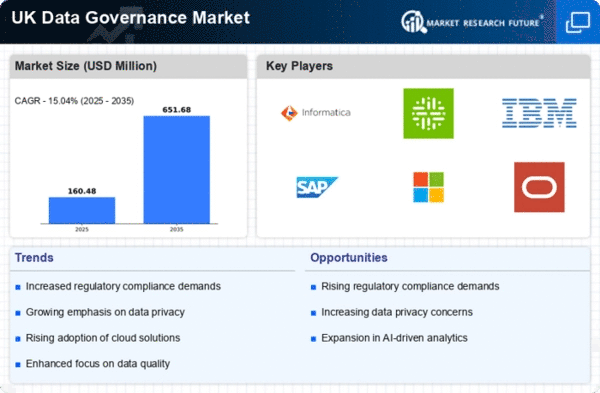Rising Data Privacy Concerns
The increasing awareness of data privacy issues among consumers and businesses is driving the data governance market. In the UK, recent surveys indicate that over 70% of individuals express concerns regarding how their personal data is managed. This heightened sensitivity compels organisations to adopt robust data governance frameworks to ensure compliance with regulations such as the Data Protection Act. As a result, the data governance market is experiencing growth, with estimates suggesting a potential increase of 15% annually. Companies are investing in solutions that enhance transparency and accountability in data handling, thereby fostering trust with their customers. This trend indicates a shift towards prioritising data privacy, which is likely to shape the future landscape of the data governance market in the UK.
Increased Regulatory Scrutiny
The data governance market is significantly influenced by the growing regulatory scrutiny faced by organisations in the UK. Regulatory bodies are intensifying their focus on data management practices, leading to stricter compliance requirements. For instance, the Information Commissioner's Office (ICO) has ramped up enforcement actions, resulting in fines exceeding £20 million for non-compliance. This environment compels businesses to invest in comprehensive data governance strategies to mitigate risks associated with regulatory breaches. The market is projected to expand as organisations seek to implement solutions that not only comply with existing regulations but also anticipate future legislative changes. Consequently, the data governance market is likely to see a surge in demand for compliance-oriented tools and services.
Growing Demand for Data Analytics
The surge in data analytics adoption across various sectors is propelling the data governance market. As organisations in the UK increasingly rely on data-driven decision-making, the need for effective data governance becomes paramount. A recent report indicates that 65% of UK businesses are prioritising data analytics initiatives, which necessitate robust governance frameworks to ensure data integrity and quality. This trend suggests that organisations are recognising the value of data as a strategic asset, leading to investments in governance solutions that facilitate accurate analytics. The data governance market is expected to grow as companies seek to align their data management practices with their analytical objectives, thereby enhancing overall business performance.
Emergence of Cloud-Based Solutions
The shift towards cloud-based solutions is reshaping the data governance market in the UK. As organisations migrate their data to cloud environments, the complexities of data management increase, necessitating effective governance strategies. Cloud service providers are offering tools that integrate data governance capabilities, which are becoming essential for businesses to maintain control over their data assets. This trend is reflected in the market, with cloud-based data governance solutions projected to account for over 40% of the total market share by 2026. The flexibility and scalability of cloud solutions are appealing to organisations, prompting them to invest in governance frameworks that can adapt to evolving data landscapes. This evolution indicates a significant transformation in how data governance is approached in the UK.
Focus on Data Lifecycle Management
Data lifecycle management emphasis is becoming a critical driver for the data governance market. Organisations in the UK are increasingly recognising the importance of managing data throughout its lifecycle, from creation to deletion. This focus is driven by the need to optimise data usage, reduce storage costs, and ensure compliance with data retention policies. As a result, businesses are investing in governance solutions that provide visibility and control over data assets at every stage. The data governance market is likely to benefit from this trend, with projections indicating a growth rate of approximately 12% annually as organisations seek to implement effective lifecycle management practices. This shift underscores the evolving nature of data governance in the context of comprehensive data management strategies.

















Leave a Comment